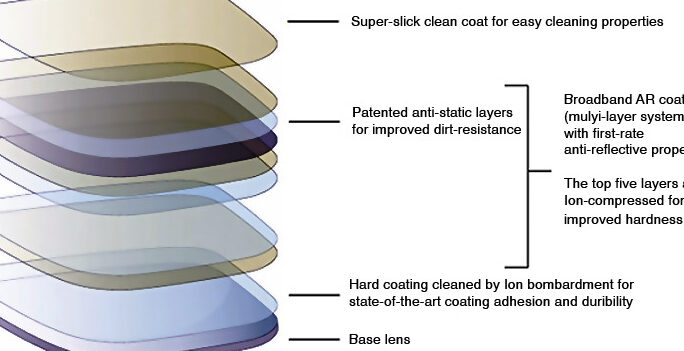Clear vision or glare-free? The truth about anti-reflective coating

Anti-reflective coating is a common feature on eyeglasses, camera lenses, and other optical devices. It promises to reduce glare, improve clarity, and enhance the overall visual experience. But is it worth the extra cost? Let's take a closer look.
What is anti-reflective coating?
Anti-reflective coating (also known as AR coating or anti-glare coating) is a thin layer of material applied to the surface of an optical lens. It is designed to reduce the amount of light that reflects off the lens, which can cause glare, halos, and other visual distortions. AR coating also allows more light to pass through the lens, which can improve clarity and color perception.
What are the benefits of anti-reflective coating?
There are several potential benefits of anti-reflective coating:
- Reduced glare: AR coating can reduce glare from artificial lighting, computer screens, and other sources of bright light. This can make it easier to see in various environments and reduce eye strain.
- Improved clarity: By reducing the amount of reflected light, AR coating can improve visual clarity and acuity. This can be especially helpful for people with certain eye conditions or for activities that require fine detail work.
- Better aesthetics: AR coating can make lenses appear clearer and more transparent, which can enhance the overall appearance of eyeglasses or other optical devices. It can also reduce the appearance of reflections on the surface of the lens.
What are the drawbacks of anti-reflective coating?
While there are many potential benefits to AR coating, there are also some drawbacks to consider:
- Higher cost: AR coating can add significant cost to eyeglasses or other optical devices. This can be a barrier for people on a tight budget or those who don't see the value in paying more for a coating.
- Scratch-prone: Some types of AR coating are more prone to scratches or damage than others. This can be frustrating if you're investing in a coating to protect your lenses.
- Not always necessary: Depending on your lifestyle, occupation, and visual needs, AR coating may not be necessary or beneficial. For example, if you primarily use your glasses for reading or watching TV at home, you may not encounter enough glare to justify the extra cost of AR coating.
Is anti-reflective coating worth it?
The answer to this question will depend on your individual needs, preferences, and budget. However, in general, we believe that anti-reflective coating is worth considering for most people.
If you spend a lot of time in bright environments or working on a computer, AR coating can significantly reduce glare and eye strain. If you have an eye condition that affects your visual clarity, AR coating may be especially beneficial. And if you want your glasses to look their best, AR coating can enhance their appearance and reduce distracting reflections.
Of course, there are some situations where AR coating may not be necessary or worth the extra cost. If you rarely encounter bright light or don't spend much time on a computer, you may not notice a significant difference with AR coating. If you're on a tight budget, you may need to prioritize other features or opt for a lower-cost coating option.
How to care for anti-reflective coating
If you do decide to invest in AR coating, it's important to take good care of your lenses to ensure they last as long as possible. Here are some tips for caring for AR-coated lenses:
- Clean them regularly: Use a microfiber cleaning cloth and lens cleaner to gently wipe away dirt, smudges, and fingerprints. Avoid using harsh chemicals or rough materials that could scratch the coating.
- Store them properly: When you're not wearing your glasses or other optical devices, store them in a case to protect them from scratches, dust, and other damage.
- Avoid high heat: Don't expose your lenses to high heat or extreme temperatures, as this can damage the AR coating.
Anti-reflective coating can be a valuable addition to eyeglasses, camera lenses, and other optical devices. It can reduce glare, improve clarity, and enhance the overall visual experience. However, it's important to weigh the potential benefits against the added cost and other factors. If you decide to invest in AR coating, be sure to care for your lenses properly to ensure they last as long as possible.
Is anti-reflective coating worth it? Yes, in most cases, anti-reflective coating is worth considering for its potential benefits. However, it's important to weigh the cost and other factors to determine if it's right for you.

You may also be interested...